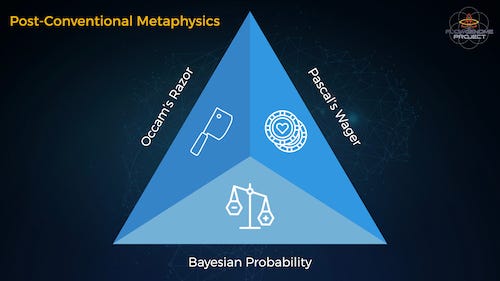Are You Lost (Or Just Not Found?)
"Not all those who wander are lost" Tolkien wrote a while ago.
That was taken as proof and permission for wooly headed hippie backpackers to go traipsing around the world without a plan or purpose. #cuzhobbits #ShireweedFTW
But let's be realistic here, sometimes, wandering around will absolutely get you lost. And as we stumble through the meta-crisis, it's happening to more and more people.
First let's define a couple of terms: Not Found, and Truly Lost.
The moment you've misplaced familiar landmarks and can no longer get back to a "known location" (like that last mountain pass, river crossing or trailhead) then you have transitioned, from momentarily "not found" (i.e. couldn't put my finger on my location on a map, but know how to retrace my steps to a place I could) to well and truly lost (i.e. don't know where I am, and don't know how to get back to where I would know where I am, either).
And more of us seem to be progressing from the briefly bewildering experience of being "not found" to wandering off into the actual (and possibly terminal) Land of the Lost. That's a problem.
Before rushing to judgment on this trend, reckon we can all give ourselves a Mulligan from 2016 until now (or the beginnings of lockdowns in 2020 if you're a tough grader).
The old maps no longer bore much resemblance to reality, our familiar landmarks shifted beneath our feet, and without a doubt, not many of us could put our finger on the chart and say with much confidence "this is where we stand in the Big Scheme of things!"
We were unmoored, and technically, un-found.
But that's not a comfortable situation to find ourselves in, and many of us have become increasingly antsy and prone to panic.
As happens predictably enough in wilderness emergencies, when we panic because we're temporarily "not found" and then wander off in search of salvation, we run a high likelihood of fucking up what would've been a recoverable situation (i.e. retrace our steps, call for help, sit tight).
Once we're actually lost, there's no ability to retreat to terra firma.
"Can't go back and you can't stand still (if the thunder don't get ya then the lightning will!"
Today, what began with a few quirkier friends wandering off the reservation, has now morphed and warped to include many colleagues who I used to consider "high discernment," entertaining all sorts of sketchy narratives about what's "really" going on in the realm of politics, economics, global markets, lockdowns, vaccines, and even final showdowns between Light and Dark.
It seems the anxiety of being "not found" has pushed many to get lost in poorly fact-checked snowballing meta-conspiracies that lead so far afield in their plots and cast of characters that there's no chance they ever point us safely back home.
So what's to be done?
Three things:
1) Stick your thumb where the sun don't shine. In this case, the back of the book where the endnotes begin. It's how I was trained to read anything as an historian, and it's really essential these days when establishment media sources (with their quaint factcheckers and journalistic standards) have yielded to outrage podcasts and viral social posts. In place of a thumb in the endnotes, consider adding an open Google search tab. SOOOO many of the most viral and inflammatory factoids getting slung around these days can be debunked with less than 5 minutes on Google. (just be sure to scroll past Fox News TV affiliates, the Daily Beast and rando blog sites, and try to get to something resembling a journal of record/primary source).
2) Watch for the green M&Ms. Van Halen supposedly put in their contract rider "a bowl of M&Ms backstage with all the green ones removed." That was a sneaky way to tell if the event venue had really read all the other critical safety stuff for a major stadium show. If they'd missed the green M&Ms, they possibly missed risers and voltage, cranes and fire safety.
These days, one of my recurring green M&Ms is anyone uncritically referencing Robert Malone as "the inventor of mRNA vaccines." The dude was a 28 year old grad student at the Salk Institute and part of a large team that did critical work in the earliest stages of mRNA development in mice. Super important, but not quite the same blanket appeal to authority that the "inventor of" label ascribes. If friends have missed that, it means they likely haven't been "doing their own research" at all, and they've been taking podcast bros and their guests at their non fact-checked word.
Another one on the other side of the spectrum are folks that regurgitate "but the vaccines are 95% effective!" and then proceed to characterize any hesitant folks as clueless and anti-social (see this article here for the distinction between largely useless Relative Risk Reduction stats like that 95% number, and Absolute Risk Reduction).
In either instance, it’s the quick tells that let you know how rigorous people are being with their own fact checks. (Just keep an eye out for the green M&Ms)
3) Develop a post-conventional metaphysics. What does that even mean? Well simply, it means combining Pascal's Wager, Occam's Razor and Bayesian Probability into a sturdy triangle of making sense. It’s provisional but precise, and allows us to conceive the inconceivable without losing the plot or our bearings. Plus it’s actually fun to realize how little we know and how many cool thought experiments we can set up to test our bestguesses and get smarter as we go. Here’s a quick excerpt from Recapture the Rapture getting into it.
It’s not complicated really. All it requires is an appropriate dose of "epistemic humility." That’s a fancy pants philosopher’s way of saying "don’t get out too far over your skis" or "stick to your knitting!" Because in a volatile and uncertain world, a tolerance for ambiguity is essential.
Then, we can check in via specifically calibrated peak states (also, another place to get spectacularly lost). At their best, they can serve as metronomes, tuning forks and training wheels––ecstatic experience can remind us what on time, in tune, and in balance actually feels like.
And finally, we can pressure test our conclusions in conversation with each other. Weave a shared reality that works for all of us, together. In this upside down world, wouldn’t that be nice?
Those are the three legs of the stool––healing, inspiration and connection––that we will be practicing. Making sense of the world, upgrading our own resilience and relationships, and finding the others, who make up our scattered worldwide tribe.
Cuz the first thing to do when we notice we’re "not found" is resist the urge to panic and make things worse by wandering off (or falling for the fleeting comfort of false certainty).
We should band together, take stock of our maps and figure how to make it back to higher ground.
Jamie and the FGP Team





